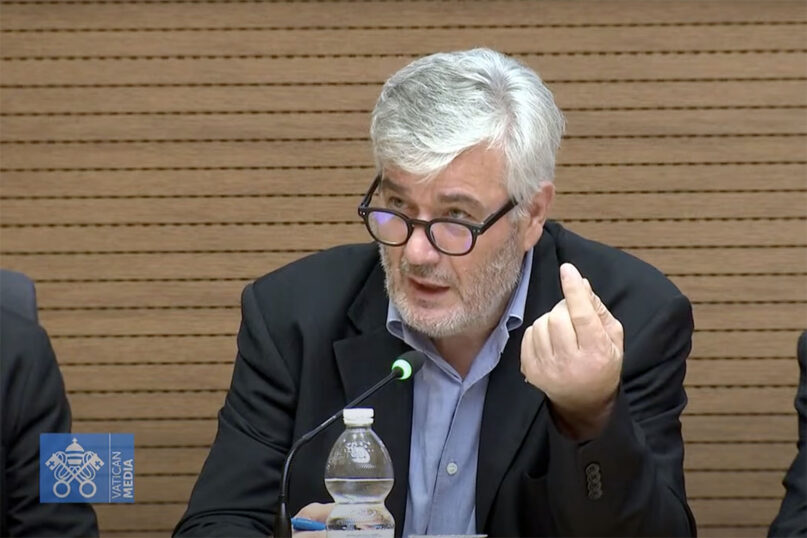VATICAN CITY (RNS) — On Thursday (Oct. 17), the Hall of the General Curia of the Society of Jesus, the Jesuit order’s headquarters in Rome, delegates to a worldwide Vatican summit gathered to talk about their hopes for a transformed Catholic Church, envisioning a church that deemphasizes hierarchy and where all faithful have a say on their local community.
“What are we willing to give up so that the church may be one?” asked the Rev. Dario Vitali, an expert on the church’s structure who teaches at Rome’s Pontifical Gregorian University.
Vitali was speaking at one of two theological forums taking place on Thursday that were intended to deepen some of the discussions currently at the center of the Synod on Synodality, Pope Francis’ 3-year-old effort to encourage dialogue on the church’s most pressing issues. Francis, who has radically transformed the shape of synods during his papacy, invited lay people and non-bishops to participate in the synod’s meetings at the Vatican over the past two Octobers.
Synod organizers created the forums to give the issues emerging at the synod more space for discussion, putting participating theologians, canon lawyers and experts on panels. The forums, unlike the synod discussions, were open to the public, allowing rare insight into the delegates’ thinking.
The synod is meant to focus on “a new way of being church,” aiming to reform church structures from parishes to bishops’ assemblies and even the papacy. As Vitali put it, “The current synodal process is giving the church a way to exercise the (papal) primacy that is new and original.” That means, he said, that the church is now understood as a community of churches.
The forum at the Jesuit building was dedicated in part to addressing the role of bishops and of the pope, and the relationship between the two. Vitale argued that Francis, by making a “complete and definitive” change to the way the local churches engage with the Vatican and vice versa, has given bishops more freedom and independence in the management of their dioceses.

The Rev. Dario Vitali addresses the theological forum at the General Curia of the Jesuits in Rome, Oct. 16, 2024. (Video screen grab)
Shocking some in the crowd, Canadian theologian Catherine E. Clifford said that almost half of the Catholic bishops in existence do not have a church and therefore don’t regularly celebrate funerals, preside at marriages and engage with their local community. Many bishops are either retired or act as auxiliary bishops — assisting in the leadership of dioceses under another bishop — while others act as papal envoys or members of the Roman Curia, the bureaucracy.
“It’s essential to reestablish the relationship between the bishops and an existing local church,” Clifford said.
Archbishop Timothy Costelloe, the head of the Australian bishops’ conference, said that in opening the synod to priests, nuns and other religious and lay members as full voting members, the synod has become an opportunity for bishops to learn how to share in the responsibility of governance and leadership.
There were voices of caution. The Rev. José San José Prisco, canon lawyer at the Pontifical University of Salamanca, said that while a good dose of decentralization might be positive for the church, it risked empowering local bishops too much, which could lead to anarchy.
RELATED:
Not too far away, a simultaneous discussion at the Augustinian Patristic Pontifical Institute focused on the relationship between local churches and the Vatican. Theologian Myriam Wijlens invited the assembly to reflect on an issue of interest from rank-and-file Catholics: the importance of strengthening local parish and diocesan councils, where lay Catholics advise priests and bishops on the issues close to their hearts.
Antonio Autiero, a theologian of ethics, said that a “ministry of listening,” an idea proposed at the synodal discussions proper, could mediate between parishes and local Catholic communities and their dioceses or the Vatican.
Amid the diversity of perspectives among the 1.3 billion Catholics in the world, the Rev. Miguel de Salis Amaral, a Portuguese theologian, insisted on the need for unity in a world marked by “polarization, individualism, wars and globalization, which informs us only on a portion of reality, but rarely unites us.”

